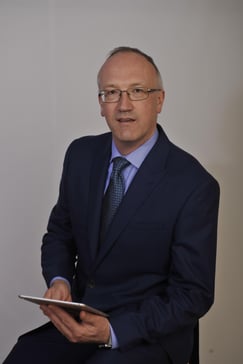Improving Access of Psychiatry Services With Telehealth
Dr. Richard Harvey is a telehealth evangelist and has been passionate about the potential of virtual care for over 30 years. In 2017 he established Telepsychiatrist.online - a highly successful virtual psychiatry clinic based in rural Victoria. Coviu interviewed Dr. Richard Harvey to learn more about his online practice and the delivery of psychiatry services online. Read on to see what Dr. Richard Harvey had to say.
 Dr Richard Harvey - Telepsychiatrist.online
Dr Richard Harvey - Telepsychiatrist.online
Can you tell us more about yourself?
I am a psychiatrist and academic. I am a clinical professor at Deakin University. I’ve been a psychiatrist for nearly 30 years. I trained in the UK, in a very specialised field of psychiatry of younger people with dementia in the 1990s. At that time, I established a telehealth program for young people with dementia and their carers. One of my early publications was on telehealth in the 1990s. In 2003 I came to Australia, worked in public and private inpatient, outpatient communities. Up until 2017, I was a clinical director of mental health, drugs, and alcohol services at a public hospital in Geelong. During my time there, I worked a lot on telehealth initiatives - I was part of a telehealth working group. We spent a lot of time trying to implement telehealth across mental health services, however, at the time there was very little interest among clinicians. In 2017 I left my job at the hospital and established telepsychiatrist.online. When I started in 2017 people thought that it was very strange and wondered why I would want to do that, but we have been through a bit of evolution since the pandemic began and telehealth is a lot more common these days.
How did your first patients find you?
I started off with a simple website and used some clever little marketing tricks to promote what I was doing to those in most need. I did some research looking at population centers around Australia that were in telehealth-eligible areas where there were none or very few private psychiatrists. I then used electronic marketing directories, such as healthdirect service finder, and created three virtual practices. One was set up in Gladstone, QLD as there were no private psychiatrists there at all. I set up the second virtual practice in Launceston TAS, where there was only one private psychiatrist. The third virtual practice location floated around South Australia a bit and most recently moved to Murray Bridge, another town with zero private psychiatrists. I also sent out a few flyers to GPs, joined the primary health networks in those areas, and got the practice on some private directories. In terms of digital marketing, I created geographically limited google advertisements and it took off very quickly from there. It didn't take long for patients to find me, generating more and more referrals from GPs. Even before COVID-19, it was really beginning to take off, and now it is well established. I have recently had to limit who I see and have a waiting list of nearly one year. It is quite hard work just managing the demand really.
What impact did the pandemic have on the demand for your services?
The demand has skyrocketed since the pandemic. Particularly with the availability of telehealth items, particularly in the city. I regularly have people calling and emailing that they cannot get an appointment to see a psychiatrist for more than two years. All psychiatrists have become saturated with demand.
How diverse is your client load?
Extremely diverse! The only types of patients I generally do not see are pregnant women and people with eating disorders, as I don’t have any experience in this area. I have got people from 16 to well over 90, whom I have seen via telehealth. My practice is now mainly focused around men's mental health, transgender mental health, and I see a lot of people with ADHD.
What strategies do you use to establish therapeutic alliance with your patients?
Firstly, having a good website that is inviting and supportive is important - then making sure that you follow through with that in the sessions. Secondly, preparing patients for their consultations. Ahead of their first appointment, we send emails educating them how telehealth is going to work, what to expect and how to connect to Coviu. I also use a lot of online assessments tools, such as the SAGE, which is a good screener for general mental health diagnosis. I have also developed a number of e-forms that I find very helpful. I usually know a lot about patients before I meet them. I try to be the best psychiatrist I can be by really listening and letting people talk for at least the first 20 minutes of the consult to really understand their issues.
What Coviu tools and features do you use to facilitate online consultations?
I very frequently use the document-sharing tool to bring up assessments and get the patient to complete them on the screen. Occasionally I also use the chat to send people a link.
How does online care vary from in-person care?
Frankly, I think it's better, to be honest. Patients seem to really like it. They talk to me about their experience of seeing psychiatrists in-person and many didn't like going to the rooms, waiting, dealing with the secretary. My patients manage all of the appointments themselves, they organise a booking and manage their referrals. I have handed it all over to my patients for them to deal with it. They are in control, they don't have to ring up and deal with a receptionist, there is no gatekeeping.
The other challenge with an in-person environment is it is really hard to look at patients' records while you are talking to them in-person. I have a very big screen and can have Coviu in the middle of it, medical records on one side and electronic software on the other side. It makes my practice safer, I can see all these things at the same time when I am talking to patients. I cannot do this easily in-person.
What have been the facilitators for you as a clinician for providing psychiatry services via telehealth?
Number one is definitely Coviu. I started off using Skype, but I did not like it at all because patients could save your account and call you after their consultation when you are seeing someone else for example. Electronic practice software has also been very very important.
Compared to in-person consults how comparable are the clinical outcomes?
Good! I get a lot of very positive feedback from my patients. A lot of patients refer their friends and family. I have almost zero no-shows, so people never fail to attend their appointments, which is a miracle. I have done surveys with GPs, and they are very happy with what they get back from me.
Are there financial benefits of running a telehealth practice vs in-person?
My overheads are extremely low. I have my Coviu subscription, medical practice subscription, and MiMS subscription. There are no building costs or electricity. I have had an NBN Enterprise Ethernet connection put in which was pricey, but not as expensive compared to buying a practice.
How does your technology setup look like in your office?
I have a 49” screen, two high-quality Logitech cameras with remote control, a good quality microphone, and a little FBI-type earpiece. I also have a background screen that I can pull down behind me and a very fast ethernet broadband connection.
What would you say to psychiatrists who are considering transitioning their practice online?
I am currently chairing the college of psychiatrists working group on the telehealth guidelines. There are a lot of psychiatrists who offer telehealth by phone - that is potentially problematic. The telephone is just not appropriate for assessing patients whom you have never met. A psychiatrist who offers telehealth really must have video available. You cannot assess a person's behavior without seeing them. You cannot be confident of who you are talking to or what their responses are when you are speaking to them. It is just not safe. There is a lot of support out there for psychiatrists wanting to transition to video telehealth, the technology is ready and can really transform your practice.




